初中名词、介词和连词
- 格式:doc
- 大小:80.00 KB
- 文档页数:12
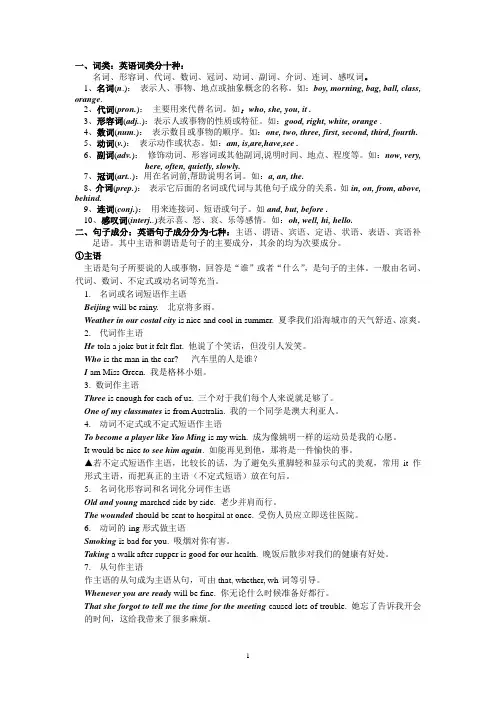
一、词类:英语词类分十种:名词、形容词、代词、数词、冠词、动词、副词、介词、连词、感叹词。
1、名词(n.):表示人、事物、地点或抽象概念的名称。
如:boy, morning, bag, ball, class, orange.2、代词(pron.):主要用来代替名词。
如:who, she, you, it .3、形容词(adj..):表示人或事物的性质或特征。
如:good, right, white, orange .4、数词(num.):表示数目或事物的顺序。
如:one, two, three, first, second, third, fourth.5、动词(v.):表示动作或状态。
如:am, is,are,have,see .6、副词(adv.):修饰动词、形容词或其他副词,说明时间、地点、程度等。
如:now, very,here, often, quietly, slowly.7、冠词(art..):用在名词前,帮助说明名词。
如:a, an, the.8、介词(prep.):表示它后面的名词或代词与其他句子成分的关系。
如in, on, from, above, behind.9、连词(conj.):用来连接词、短语或句子。
如and, but, before .10、感叹词(interj..)表示喜、怒、哀、乐等感情。
如:oh, well, hi, hello.二、句子成分:英语句子成分分为七种:主语、谓语、宾语、定语、状语、表语、宾语补足语。
其中主语和谓语是句子的主要成分,其余的均为次要成分。
①主语主语是句子所要说的人或事物,回答是“谁”或者“什么”,是句子的主体。
一般由名词、代词、数词、不定式或动名词等充当。
1.名词或名词短语作主语Beijing will be rainy. 北京将多雨。
Weather in our costal city is nice and cool in summer. 夏季我们沿海城市的天气舒适、凉爽。
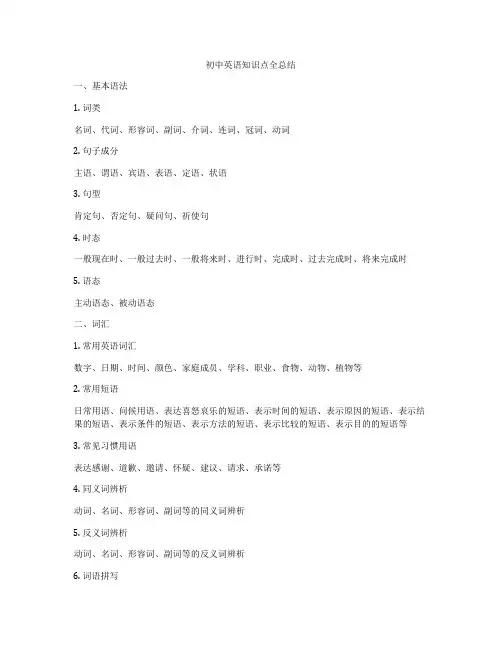
初中英语知识点全总结一、基本语法1. 词类名词、代词、形容词、副词、介词、连词、冠词、动词2. 句子成分主语、谓语、宾语、表语、定语、状语3. 句型肯定句、否定句、疑问句、祈使句4. 时态一般现在时、一般过去时、一般将来时、进行时、完成时、过去完成时、将来完成时5. 语态主动语态、被动语态二、词汇1. 常用英语词汇数字、日期、时间、颜色、家庭成员、学科、职业、食物、动物、植物等2. 常用短语日常用语、问候用语、表达喜怒哀乐的短语、表示时间的短语、表示原因的短语、表示结果的短语、表示条件的短语、表示方法的短语、表示比较的短语、表示目的的短语等3. 常见习惯用语表达感谢、道歉、邀请、怀疑、建议、请求、承诺等4. 同义词辨析动词、名词、形容词、副词等的同义词辨析5. 反义词辨析动词、名词、形容词、副词等的反义词辨析6. 词语拼写常见的易错拼写单词、易混淆单词、词汇记忆技巧7. 词语辨析容易混淆的近义词、疑难词语的理解三、句型转换1. 肯定句转换否定句2. 否定句转换肯定句3. 陈述句转换疑问句4. 一般疑问句转换特殊疑问句5. 直接引语转换为间接引语6. 主动语态转换为被动语态7. 定语从句的转换8. 状语从句的转换四、阅读理解1. 阅读短文阅读理解题型、文章的类型、文章的结构、文章的主题,作者的观点和态度分析,文章细节理解等2. 理解词语和短语根据上下文理解词语和短语,推测词义,理解事实和信息,归纳文章主旨等3. 阅读策略找主题句、段落大意概括、理解作者的意图等4. 阅读技巧速读、精读、细读,快速定位等五、听力1. 日常生活对话日常生活对话、问路、购物、订餐、电话、预约、乘坐交通工具等2. 学校生活对话上课、放学、作业、考试、运动会、话剧表演、校园活动等3. 交际用语问候、介绍自己、询问信息、表达感谢、道歉、请求、承诺、邀请、祝福等4. 语音语调语音语调的基本规律和特点,英语连读、舌尖音、上音,语调变化等六、写作1. 书面表达书信、便条、日记、日程安排、活动安排、口头表达等2. 写信格式信头、信尾、日期、称呼等3. 作文结构作文的开头、扩写、过渡、结尾等4. 句式转换改写句子、段落,使表达更加丰富多样5. 表达方式使用例证、比喻、排比、描写等,使文章更生动七、语法专题1. 介词介词的常见用法和搭配2. 连词并列连词、从属连词的用法和区别3. 形容词和副词形容词和副词的比较级和最高级,以及用法区别4. 名词的单数复数名词单数复数的变化规则5. 疑问词及疑问句特殊疑问词和疑问句的结构6. 定语从句定语从句的连接词和用法7. 状语从句状语从句的连接词和用法八、语言运用1. 情态动词can、could、may、might、must、shall、should、will、would、ought to的用法2. 动词的时态和语态一般现在时、一般过去时、一般将来时、进行时、完成时、过去完成时、将来完成时等动词时态,以及主动语态和被动语态的用法3. 句子的语序陈述句、一般疑问句、特殊疑问句、祈使句的语序规则4. 词语辨析同义词、反义词、单词形式的变换5. 词语的搭配不同词义的搭配,固定搭配的用法6. 语法填空根据语境选择合适的词语或词组来填充空白7. 交际用语日常生活中常用的交际用语的表达九、复习技巧1. 听力技巧听力材料的整体理解、选项干扰性的词、对话文章的表达、上下文对比等2. 阅读技巧细节题、主旨题、归纳题、推理题等题型的解题技巧3. 写作技巧书面表达的开头展开结尾的写作技巧4. 背诵技巧词汇、短语的背诵技巧5. 口语表达表达能力的提升、语音语调的模仿等技巧以上就是初中英语知识点的全面总结,希望对学习英语的同学有所帮助。
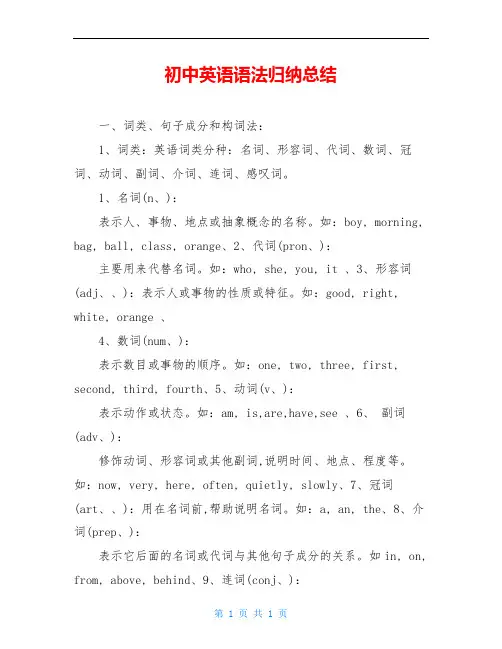
初中英语语法归纳总结一、词类、句子成分和构词法:1、词类:英语词类分种:名词、形容词、代词、数词、冠词、动词、副词、介词、连词、感叹词。
1、名词(n、):表示人、事物、地点或抽象概念的名称。
如:boy, morning, bag, ball, class, orange、2、代词(pron、):主要用来代替名词。
如:who, she, you, it 、3、形容词(adj、、):表示人或事物的性质或特征。
如:good, right, white, orange 、4、数词(num、):表示数目或事物的顺序。
如:one, two, three, first, second, third, fourth、5、动词(v、):表示动作或状态。
如:am, is,are,have,see 、6、副词(adv、):修饰动词、形容词或其他副词,说明时间、地点、程度等。
如:now, very, here, often, quietly, slowly、7、冠词(art、、):用在名词前,帮助说明名词。
如:a, an, the、8、介词(prep、):表示它后面的名词或代词与其他句子成分的关系。
如in, on, from, above, behind、9、连词(conj、):用来连接词、短语或句子。
如and, but, before 、10、感叹词(interj、、)表示喜、怒、哀、乐等感情。
如:oh, well, hi, hello、2、句子成分:英语句子成分分为七种:主语、谓语、宾语、定语、状语、表语、宾语补足语。
1、主语是句子所要说的人或事物,回答是“谁”或者“什么”。
通常用名词或代词担任。
如:I’m Miss Green、(我是格林小姐)2、谓语动词说明主语的动作或状态,回答“做(什么)”。
主要由动词担任。
如:Jack cleans the room every day、 (杰克每天打扫房间)3、表语在系动词之后,说明主语的身份或特征,回答是“什么”或者“怎么样”。
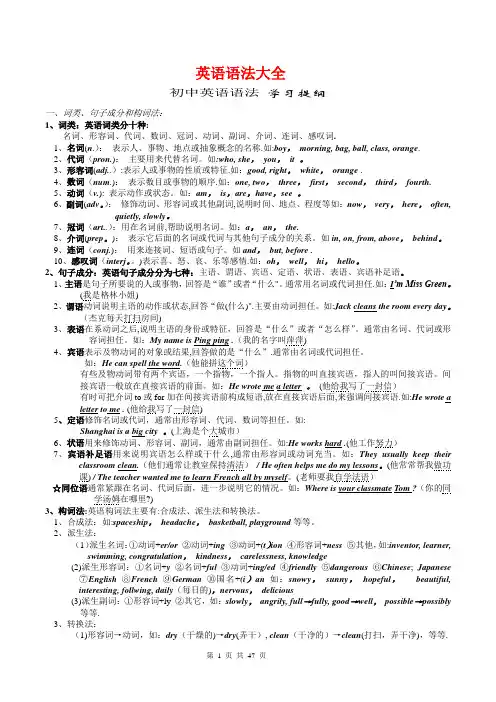
英语语法大全初中英语语法学习提纲一、词类、句子成分和构词法:1、词类:英语词类分十种:名词、形容词、代词、数词、冠词、动词、副词、介词、连词、感叹词.1、名词(n.):表示人、事物、地点或抽象概念的名称.如:boy,morning, bag, ball, class, orange.2、代词(pron.):主要用来代替名词。
如:who, she,you,it 。
3、形容词(adj..):表示人或事物的性质或特征.如:good, right,white,orange .4、数词(num.):表示数目或事物的顺序.如:one, two,three,first,second,third,fourth.5、动词(v.): 表示动作或状态。
如:am,is,are,have,see 。
6、副词(adv。
):修饰动词、形容词或其他副词,说明时间、地点、程度等如:now,very,here,often,quietly, slowly。
7、冠词(art..):用在名词前,帮助说明名词。
如:a,an,the.8、介词(prep。
):表示它后面的名词或代词与其他句子成分的关系。
如in, on, from, above,behind。
9、连词(conj.):用来连接词、短语或句子。
如and,but, before .10、感叹词(interj。
)表示喜、怒、哀、乐等感情.如:oh,well,hi,hello。
2、句子成分:英语句子成分分为七种:主语、谓语、宾语、定语、状语、表语、宾语补足语。
1、主语是句子所要说的人或事物,回答是“谁”或者“什么"。
通常用名词或代词担任.如:I’m Miss Green。
(我是格林小姐)2、谓语动词说明主语的动作或状态,回答“做(什么)".主要由动词担任。
如:Jack cleans the room every day。
(杰克每天打扫房间)3、表语在系动词之后,说明主语的身份或特征,回答是“什么”或者“怎么样”。
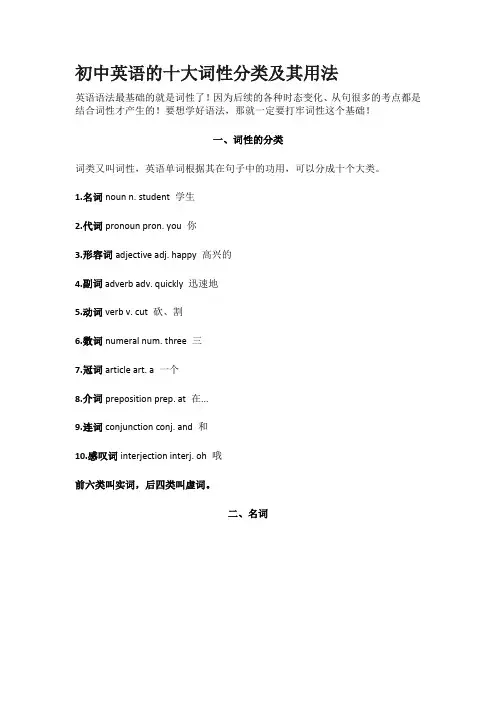
初中英语的十大词性分类及其用法英语语法最基础的就是词性了!因为后续的各种时态变化、从句很多的考点都是结合词性才产生的!要想学好语法,那就一定要打牢词性这个基础!一、词性的分类词类又叫词性,英语单词根据其在句子中的功用,可以分成十个大类。
1.名词noun n. student 学生2.代词pronoun pron. you 你3.形容词adjective adj. happy 高兴的4.副词adverb adv. quickly 迅速地5.动词verb v. cut 砍、割6.数词numeral num. three 三7.冠词article art. a 一个8.介词preposition prep. at 在...9.连词conjunction conj. and 和10.感叹词interjection interj. oh 哦前六类叫实词,后四类叫虚词。
二、名词名词复数的规则变化名词的所有格在英语中有些名词可以加“‘s”来表示所有关系,带这种词尾的名词形式称为该名词的所有格,如:a teacher’s book。
名词所有格的规则如下:1)单数名词词尾加“'s”,复数名词词尾没有s,也要加“'s”,如the boy‘s bag 男孩的书包,men’s room 男厕所。
2)若名词已有复数词尾-s ,只加“'”,如:the workers’ struggle工人的斗争。
三、代词大多数代词具有名词和形容词的功能。
英语中的代词,按其意义、特征及在句中的作用分为:人称代词、物主代词、指示代词、反身代词、相互代词、疑问代词、关系代词、连接代词和不定代词九种人称代词的用法:I saw her with them,at least,I thought it was her.我看到她和他们在一起,至少我认为是她。
(her做宾语,them做介词宾语,her作主补)a. -- Who broke the vase?--谁打碎了花瓶?b. -- Me.--我。
![初中英语语法大全[知识点总结材料可打印]](https://uimg.taocdn.com/06b2ed9bff00bed5b9f31def.webp)
英语语法大全初中英语语法学习提纲一、词类、句子成分和构词法:1、词类:英语词类分十种:名词、形容词、代词、数词、冠词、动词、副词、介词、连词、感叹词。
1、名词(n.):表示人、事物、地点或抽象概念的名称。
如:boy, morning, bag, ball, class, orange.2、代词(pron.):主要用来代替名词。
如:who, she, you, it .3、形容词(adj..):表示人或事物的性质或特征。
如:good, right, white, orange .4、数词(num.):表示数目或事物的顺序。
如:one, two, three, first, second, third, fourth.5、动词(v.):表示动作或状态。
如:am, is,are,have,see .6、副词(adv.):修饰动词、形容词或其他副词,说明时间、地点、程度等。
如:now, very,here, often, quietly, slowly.7、冠词(art..):用在名词前,帮助说明名词。
如:a, an, the.8、介词(prep.):表示它后面的名词或代词与其他句子成分的关系。
如in, on, from, above, behind.9、连词(conj.):用来连接词、短语或句子。
如and, but, before .10、感叹词(interj..)表示喜、怒、哀、乐等感情。
如:oh, well, hi, hello.2、句子成分:英语句子成分分为七种:主语、谓语、宾语、定语、状语、表语、宾语补足语。
1、主语是句子所要说的人或事物,回答是“谁”或者“什么”。
通常用名词或代词担任。
如:I’m Miss Green.(我是格林小姐)2、谓语动词说明主语的动作或状态,回答“做(什么)”。
主要由动词担任。
如:Jack cleansthe room every day. (杰克每天打扫房间)3、表语在系动词之后,说明主语的身份或特征,回答是“什么”或者“怎么样”。
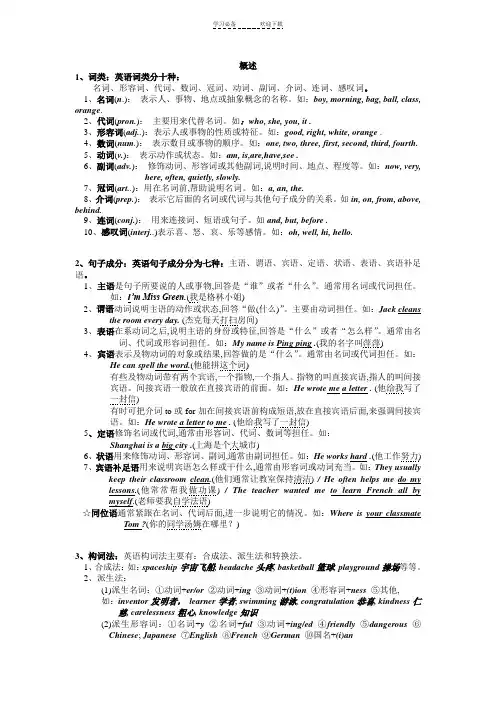
概述1、词类:英语词类分十种:名词、形容词、代词、数词、冠词、动词、副词、介词、连词、感叹词。
1、名词(n.):表示人、事物、地点或抽象概念的名称。
如:boy, morning, bag, ball, class, orange.2、代词(pron.):主要用来代替名词。
如:who, she, you, it .3、形容词(adj..):表示人或事物的性质或特征。
如:good, right, white, orange .4、数词(num.):表示数目或事物的顺序。
如:one, two, three, first, second, third, fourth.5、动词(v.):表示动作或状态。
如:am, is,are,have,see .6、副词(adv.):修饰动词、形容词或其他副词,说明时间、地点、程度等。
如:now, very,here, often, quietly, slowly.7、冠词(art..):用在名词前,帮助说明名词。
如:a, an, the.8、介词(prep.):表示它后面的名词或代词与其他句子成分的关系。
如in, on, from, above, behind.9、连词(conj.):用来连接词、短语或句子。
如and, but, before .10、感叹词(interj..)表示喜、怒、哀、乐等感情。
如:oh, well, hi, hello.2、句子成分:英语句子成分分为七种:主语、谓语、宾语、定语、状语、表语、宾语补足语。
1、主语是句子所要说的人或事物,回答是“谁”或者“什么”。
通常用名词或代词担任。
如:I’m Miss Green.(我是格林小姐)2、谓语动词说明主语的动作或状态,回答“做(什么)”。
主要由动词担任。
如:Jack cleansthe room every day. (杰克每天打扫房间)3、表语在系动词之后,说明主语的身份或特征,回答是“什么”或者“怎么样”。
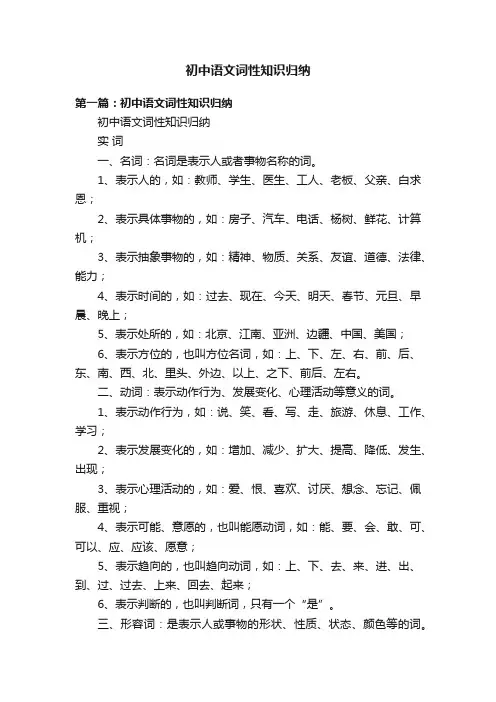
初中语文词性知识归纳第一篇:初中语文词性知识归纳初中语文词性知识归纳实词一、名词:名词是表示人或者事物名称的词。
1、表示人的,如:教师、学生、医生、工人、老板、父亲、白求恩;2、表示具体事物的,如:房子、汽车、电话、杨树、鲜花、计算机;3、表示抽象事物的,如:精神、物质、关系、友谊、道德、法律、能力;4、表示时间的,如:过去、现在、今天、明天、春节、元旦、早晨、晚上;5、表示处所的,如:北京、江南、亚洲、边疆、中国、美国;6、表示方位的,也叫方位名词,如:上、下、左、右、前、后、东、南、西、北、里头、外边、以上、之下、前后、左右。
二、动词:表示动作行为、发展变化、心理活动等意义的词。
1、表示动作行为,如:说、笑、看、写、走、旅游、休息、工作、学习;2、表示发展变化的,如:增加、减少、扩大、提高、降低、发生、出现;3、表示心理活动的,如:爱、恨、喜欢、讨厌、想念、忘记、佩服、重视;4、表示可能、意愿的,也叫能愿动词,如:能、要、会、敢、可、可以、应、应该、愿意;5、表示趋向的,也叫趋向动词,如:上、下、去、来、进、出、到、过、过去、上来、回去、起来;6、表示判断的,也叫判断词,只有一个“是”。
三、形容词:是表示人或事物的形状、性质、状态、颜色等的词。
1、表示形状,如:大、小、高、矮、宽、窄、长、短、笔直、弯曲;2、表示性质的,如:好、坏、美、丑、纯粹、高明、高尚、美丽、诚实;3、表示状态的,如:快、慢、软、硬、悠闲、忙碌、兴奋、激动;4、表示颜色,如:黑、白、红、青、苍白、碧绿、绿油油、金灿灿、红彤彤。
四、数词:是表示数目的词。
1、表示确数,如:一、二、百、千、万;2、表示概数,如:几、些、多、约;3、表示序数,如:第一、老二、初五。
五、量词:表示单位的词。
1、表示事物单位的物量词,如:个、台、条、件、对、双、群、类、米、千克、公里、吨;2、表示动作行为单位的动量词,如:次、趟、回、遍。
六、代词:是代替其它的词或者短语、名子的词。
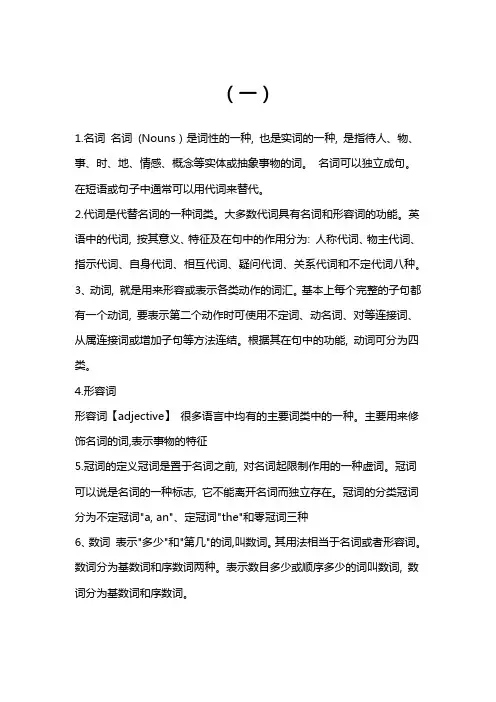
(一)1.名词名词(Nouns)是词性的一种, 也是实词的一种, 是指待人、物、事、时、地、情感、概念等实体或抽象事物的词。
名词可以独立成句。
在短语或句子中通常可以用代词来替代。
2.代词是代替名词的一种词类。
大多数代词具有名词和形容词的功能。
英语中的代词, 按其意义、特征及在句中的作用分为: 人称代词、物主代词、指示代词、自身代词、相互代词、疑问代词、关系代词和不定代词八种。
3、动词, 就是用来形容或表示各类动作的词汇。
基本上每个完整的子句都有一个动词, 要表示第二个动作时可使用不定词、动名词、对等连接词、从属连接词或增加子句等方法连结。
根据其在句中的功能, 动词可分为四类。
4.形容词形容词【adjective】很多语言中均有的主要词类中的一种。
主要用来修饰名词的词,表示事物的特征5.冠词的定义冠词是置于名词之前, 对名词起限制作用的一种虚词。
冠词可以说是名词的一种标志, 它不能离开名词而独立存在。
冠词的分类冠词分为不定冠词"a, an"、定冠词"the"和零冠词三种6、数词表示"多少"和"第几"的词,叫数词。
其用法相当于名词或者形容词。
数词分为基数词和序数词两种。
表示数目多少或顺序多少的词叫数词, 数词分为基数词和序数词。
7、副词(Adverb)副词的定义: 副词是一种用来修饰动词,形容词,副词或全句的词,说明时间,地点,程度,方式等概念。
8、介词的定义和特征介词是一种用来表示词与词, 词与句之间的关系的词。
在句中不能单独作句字成分。
介词后面一般有名词代词或相当于名词的其他词类, 短语或从句作它的宾语。
(二)1.名词, 人或事物的名称3.代词, 代替名词或者数词(比如some就是代替数目)3.动词, 动作或状态4.数词, 表示数目或顺序(比如序数词, 5th就是表示顺序)5.形容词, 人或事物的性质或状态(因为形容词一般修饰名词)6.副词, 动作的特征或性状特征(因为副词一般修饰动词或形容词)7、冠词, 表示名词的泛指或特指8、介词, 表示名词或代词与其他词的关系(因为介词后面一半紧跟名词, 代词或其他名词性结构)9、连词, 连接词与词, 短语与短语, 句子与句子10、感叹词, 表示说话时的感情或语气(三)1.adj./ a.形容词用来描述一类物质的性质,状态,外貌,或人的性格特点,性质,品格如:big,happy2.adv./ ad.副词用来修饰动作或形容词,一般在句子中做状语用表示动作的进行怎样,或表示程度,特点,如:clearly,happily3.prep.介词连接地点,时间的一类词语,可以表示方位,时间.跟一些表示时间,地点的词连用表示介词词组如:in,to,on,under4.conj.连词用来连接时间,地点,原因,结果的一类词语如:when,beacuse,so5.num.数词表示数字的词,既可以是基数词,也可以是序数词如:one,two,first6.int.感叹词表示感叹的一类词,一般不加一解释,只代表感叹如:what,how,haurray7、vt.及物动词(后面要加宾语)行为动作的词如:do,finish,play8、vi.不及物动词(后面不加宾语)表示行为动作的词如:appear9、n.名词表示物体,物质的词如:pig,cow,man10、pron.代词代指一类人,事或物的词如:he,she,hers,his,things11.art = 冠词, article的缩写(四)在英语语法中主要把词分为8大类:1. 名词: 表示人、物或地方等, 如: John, teacher;table, pen;London;beauty.2. 代词: 用来代替名词, 以避免重复某个名词, 如: I, you, it, that, those, them.3.形容词:用来修饰或限制某个(些)名词, 如:good(man), white (paper), every(book), much(water), (John is)hon-est, (He seems)lazy.被修饰或限制的名词, 叫做主体词(head-word)。

![初中英语语法大全[知识点总结可打印].docx](https://uimg.taocdn.com/38936b84bed5b9f3f80f1c08.webp)
英语语法大全初中英语语法学习提纲一、词类、句子成分和构词法:1、词类:英语词类分十种:名词、形容词、代词、数词、冠词、动词、副词、介词、连词、感叹词。
1、名词 (n.):表示人、事物、地点或抽象概念的名称。
如:boy, morning, bag, ball, class, orange.2、代词 (pron.):主要用来代替名词。
如:who, she, you, it .3、形容词 (adj..):表示人或事物的性质或特征。
如:good, right, white, orange.4、数词 (num.):表示数目或事物的顺序。
如:one, two, three, first, second, third, fourth.5、动词 (v.):表示动作或状态。
如:am, is,are,have,see .6、副词 ( adv.):修饰动词、形容词或其他副词,说明时间、地点、程度等。
如:now, very,here, often, quietly, slowly.7、冠词 (art..):用在名词前 ,帮助说明名词。
如:a, an, the.8、介词 ( prep.):表示它后面的名词或代词与其他句子成分的关系。
如 in, on, from, above, behind.9、连词 (conj.):用来连接词、短语或句子。
如and, but, before .10、感叹词 (interj..)表示喜、怒、哀、乐等感情。
如:oh, well, hi, hello.2、句子成分:英语句子成分分为七种:主语、谓语、宾语、定语、状语、表语、宾语补足语。
1、主语是句子所要说的人或事物,回答是“谁”或者“什么” 。
通常用名词或代词担任。
如: I ’m Miss Green(我.是格林小姐)2、谓语动词说明主语的动作或状态,回答“做 (什么 )”。
主要由动词担任。
如:Jack cleansthe room every day.(杰克每天打扫房间)3、表语在系动词之后 ,说明主语的身份或特征 ,回答是“什么”或者“怎么样”。
英语句子的基本成分一、词类能够自由运用的最小语言单位叫词。
根据词的形式、意义及其在句中的作用所作的分类叫词类(parts of speech)。
英语的词通常分为十大类,即名词、冠词、代词、数词、形容词、副词、动词、介词、连词和感叹词。
现分别叙述如下:(一)名词名词(noun)是表示人、事物、地点或抽象概念的名称。
例如:foreigner外国人 soap 肥皂 Newton牛顿law 法律 freedom自由 peace 和平英语名词可分为两大类:(二)冠词冠词(article)放在名词之前,帮助说明该名词所指的对象。
冠词分为不定冠词(三)代词代词(pronoun)是用来指代人或事物的词。
代词包括:1。
人称代词,如:I, you, they, it等;2。
物主代词,如:my, his, their, our, mine, hers等;3。
反身代词,如:myself, yourself, itself, ourselves, oneself等;4。
相互代词,如:each other, one another等;5。
指示代词,如:this, that, these, those, such, same等;6。
疑问代词,如:who, whom, whose, which, what等;7。
关系代词,如:who, whom, whose, which, that等;8。
不定代词,如:some, any, no, all, one, every, many, a little, someone, anything 等;(四)数词数词(numeral)是表示“数量”和“顺序”的词。
前者称为基数词,例如:one(一),twenty (二十),thirty-five(三十五),one hundred and ninety-five(一百九十五)等;后者称为序数词,例如:first(第一),twentieth(第二十),fifty-first(第五十一等。
英语语法分解大全初中英语语法是学习英语的基础,掌握好各种语法结构对于初中英语学习来说至关重要。
本文将为大家提供一份初中英语语法大全,帮助同学们全面了解和掌握各类语法结构。
一、名词名词是指表示人、事物、地点、抽象概念等的词语。
在句子中,名词常常作为主语、宾语、表语等成分出现。
英语中的名词分为可数名词和不可数名词。
1. 可数名词:表示可以计数的名词,可以有单数和复数形式,且单复数形式之间有规则变化。
单数形式:cat(猫),book(书)复数形式:cats(猫),books(书)2. 不可数名词:表示不可计数的名词,只有单数形式,不能加s来表示复数。
例句:water(水),milk(牛奶)二、冠词冠词是一类小词,放在名词的前面,用来确定名词的范围和指向。
1. 定冠词:the例句:The book is on the desk.(这本书在桌子上。
)2. 不定冠词:a、ana用于以辅音音素开头的词前,an用于以元音音素开头的词前。
例句:I have an apple.(我有一个苹果。
)三、形容词形容词是用来修饰名词或代词的词语。
形容词可以用来描述人、事物的性质、特点等。
1. 形容词的比较级和最高级形容词的比较级和最高级分别表示两个或多个事物之间的比较。
比较级的构成规则:原级+er(形容词短词可以在后面加-er)或在前面加more最高级的构成规则:原级+est(形容词短词可以在后面加-est)或在前面加most例句:She is taller than her sister.(她比她妹妹高。
)2. 形容词的位置形容词通常位于名词前。
例句:I have a blue car.(我有一辆蓝色的汽车。
)四、副词副词是用来修饰动词、形容词、其他副词或整个句子的词语。
1. 副词的分类副词可以分为时间副词、地点副词、程度副词等。
时间副词:now(现在),today(今天)地点副词:here(这里),there(那里)程度副词:very(很),really(真的)2. 副词的比较级和最高级副词的构成规则和形容词相同。
名词表示人、事物、地点或抽象概念的名称的词中考考点1.正确识别可数名词和不可数名词。
2.掌握可数名词复数的构成。
3.掌握名词所有格和名词作定语的用法。
考点一不可数名词不可数名词:没有复数形式,不可数名词前面不能用a/an。
必须要记住的不可数名词:液体类water,milk,juice,orange,coffee,tea,coke, ink, rain, wine食物类meat,fish,chicken,beef,pork,mutton,rice, salt, sugar, porridge, bread语言类Chinese,Japanese,English,French,German, Russian材料类metal,paper,glass,grass,bamboo,cotton, silk, wool, wood, hair, plastic其他类snow,ice,wind,sunshine,news,music,weather,money,knowledge,homework,housework, teamwork, help, information, rubbish(waste), light, medicine2.不可数名词的量化表达(1)借助some,much,little,a little,a lot of,lots of,plenty of等来表示。
如:much water,some orange juice, a little milk(2) 借助容器来表示。
如:一杯咖啡a cup of coffee,十袋米ten bags of rice(3) 借助计量单位来表示。
如:一张纸a piece of paper, 一片面包a slice of bread3.既可数又不可数的名词有些名词既能用作可数名词,又能用作不可数名词,但意义不同。
如:chicken—鸡(可数); 鸡肉(不可数) room—房间(可数); 空间(不可数)fish—鱼(可数); 鱼肉(不可数) glass—玻璃杯(可数); 玻璃(不可数) paper—试卷,报纸(可数); 纸张(不可数) time—倍数,次数(可数); 时间(不可数) work—作品(可数); 工作(不可数) experience—经历(可数); 经验(不可数)考点二可数名词1.规则名词复数的构成●一般情况加-s map→maps bag→bags year→years●以s, x, sh, ch 等结尾的词加-esbus→buses box→boxes wish→wishes beach→beaches●以“辅音字母+y”结尾的词变y为i, 再加-esstory→stories family→families party→parties●以“元音字母+y”结尾的词直接加-sday→days key→keys monkey→monkeys●以“辅音字母+o”结尾的词无生命的加-s,有生命的加-esphoto→photos tomato→tomatoes potato→potatoes hero→heroes●以“元音字母+o”结尾的词直接加-szoo→zoos radio→radios kangaroo→kangaroos●以f或fe结尾的词大多数变f或fe为v或ve,再加-sknife→knives leaf→leaves shelf→shelves thief→thieves2.不规则名词复数形式的构成●改变单数名词中的元音字母foot→feet; tooth→teeth; man→men;woman→women; policeman→policemen;policewoman→policewomen; Englishman→Englishmen●单复数形式相同Japanese; sheep; Chinese●只有复数形式trousers; glasses; clothes; people; pants●其他mouse→mice; child→children考点三名词所有格1.构成(1)有生命的名词所有格的构成方法:①一般情况下在表示有生命的物体的名词后加's。
如:迈克的汽车Mike’s car 我妈妈的生日my mother’s birthday②以s结尾的复数名词只加'。
如:教师节Teachers’ day③不以s结尾的复数名词,直接在词尾加's 。
如:儿童节Children’s day(2)无生命的名词的所有格一般由“of+表示无生命的物体的名词”构成。
如:我们教室的一张照片a photo of our classroom 一张中国地图 a map of China[注意] 表示时间、距离、集体、国家、团体等无生命的名词也可用's构成所有格。
如:今天的报纸today’s newspaper 世界人口the world’s population2.特殊用法(1)表示一件东西为两人或三人共有时,只需在最后一个名词后加's,后面所跟名词用单数;表示各自所有时,则需在每个名词后加's,后面所跟名词用复数。
如:莉莉和露西共有的房间Lily and Lucy’s room莉莉和露西各自的房间Lily’s and Lucy’s room(2)表示“某人家”、“店铺”、“诊所”等处所。
如:在李雷家at Li Lei's 在医生的诊所at the doctor’s 在药店at the chemist's(3)双重所有格表示整体中的一部分,结构为“of+名词所有格” 或“of+名词性物主代词”。
如:我父亲的一本书a book of my f ather’s我的一个朋友a friend of mine=one of my friends用括号中所给单词的适当形式填空1.We should learn from __heroes_ (hero).2._Leaves_(leaf) turn green in spring.3._Teachers’__ (teacher) Day is on September 10th.4.I think Jackie Chan is one of the most popular _actors_ (actor).I like him very much. 5.The two _boys’_(boy) jackets are very new.6.He is a friend of my __sister’s__(sister).7.All the _women_(woman) teachers are happy on March 8th.8.My dream is to be a famous doctor and save patients’ _lives_(life).9.Here are some _photos_ (photo) for you.10.Those _policemen_ (policeman) are looking for the lost kids.11. A good teacher is a good _listener_(listen). A teacher is there to listen to every student and help them out.12.Here are five _bottles_(bottle) of _juice_(juice) for you.13.How many _days_(day) are there in a week?14.The dictionary is not mine, but _Xiao Zhou’s_(Xiao Zhou).15.Now people hope to eat healthily and begin to care about the_safety_(safe) of food. 16.How many times do you brush your __teeth__(tooth) every day?17.Take a short rest after two _hours’_(hour) hard work, and you won't feel too tired.介词prep.介词不能单独使用,它要放在名词、代词或者相当于名词的结构前面。
中考考点1.介词表示时间、方位、方式的基本用法。
2.一些易混介词的辨析及介词短语的运用。
介词的种类简单介词:只是一个单词,如:in, on at.....短语介词:两个以上单词集合而成,如:out of, because of, in front of.....一.表示时间的介词1)表示年、月、日、时刻等用:in, on, at① at 用于表示时刻、时间的某一点at nine o’clock; at breakfast, at lunch, at noon, at night; at first, at last; at present; at the same time; at the end of 1999; at the age of;② on 用于表示具体某天,或某一天的上午、下午或晚上,或节日on Monday, on Tuesday morning, on June 6, 1996; on Christmas Day, on time③ in 用于表示周、月、年、季节和泛指的上午、下午或晚上in the week, in May, in 1995, in summer, in the evening, in time, in a minute,注意:当时间名词前有this, last, next, every等修饰时,其前面不用介词this morning, last year, next month, every week.2)表示时间的前后用:before after① before在......之前Wash your hands before dinner. (作介词后跟名词)He will call me before he leaves here. (作连词后跟从句)② after 在......之后Let’s go shopping after school. (作介词后跟名词)Please close the door after you leave the room.(作连词后跟从句)3)表示期限用:by, until/till①by 在....之前,截止到.....He had read twenty books by the end of last year. 在.....底之前She had left by the time I arrived. 在......之前②until/till 直到......为止We didn’t begin to watch TV until nine o’clock.I will wait for him until he comes here.4)表示期间用:for, during,through① for+一段时间(多跟表具体天数的数字名词)有……之久We will stay in the city for two days. He has lived here for 20 years.② during+一段时间(绝不跟表数字的名词)在.....期间He lives with us during these years.They are going to have a good rest during the summer holiday.③ through 一直,整个(从开始到结束)They played the cards through the night. He stayed in London through the winter. 5)表示时间的起点用:from, since① from 从.....起, 常用于from.....to.....句型From now on, I will learn English in the morning.The meeting will be held from eight to ten.② since自从.......以来, 后接时间点, 句子常用完成时。